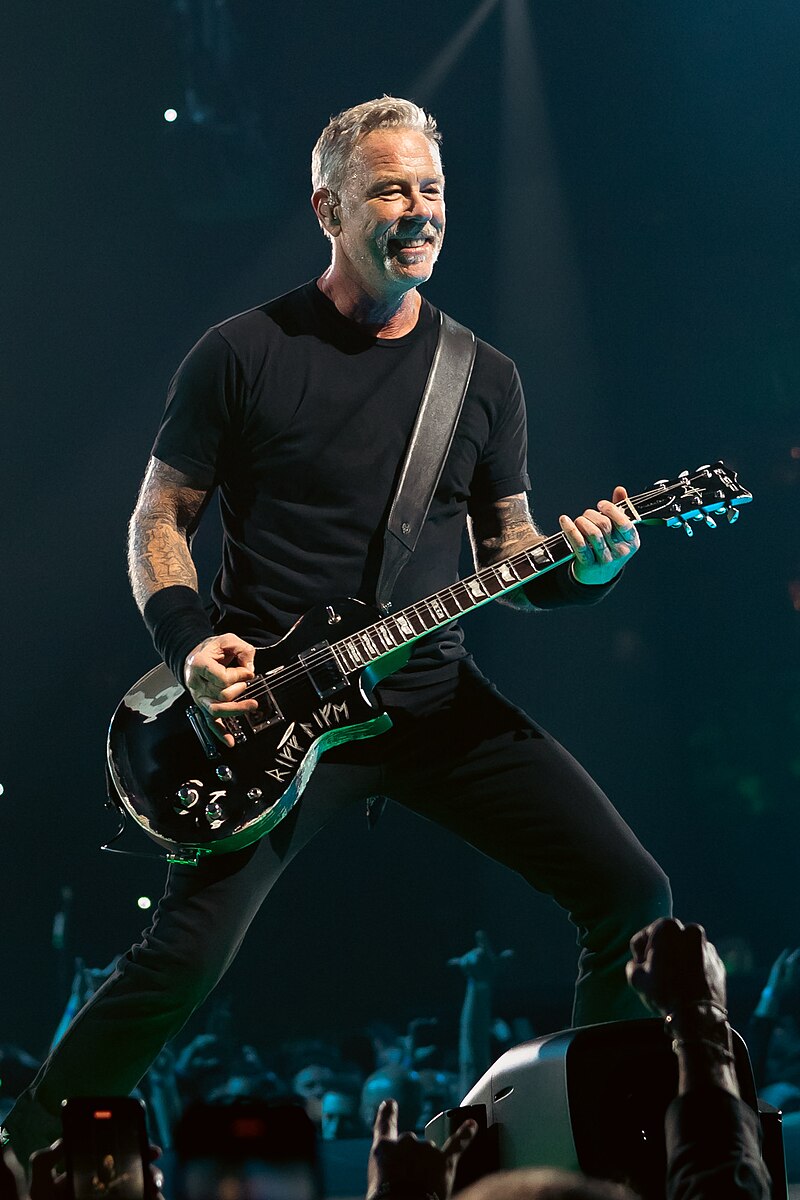James Hetfield - A Life In Sound
When you think about the sheer force of heavy music, a few names naturally come to mind. Among those, James Alan Hetfield stands tall, a figure who has, you know, shaped the very sound of thrash metal for so many people. Born on August 3, 1963, this American musician isn't just a performer; he's someone who has truly lived his art, putting his whole being into every note and every lyric. His presence, really, has become synonymous with a particular kind of musical energy, a raw, undeniable drive that grabs hold of you and doesn't let go.
It's interesting, too, how a person can become a symbol of something so big, almost without trying, yet with a clear sense of what they're doing. As a central figure from one of the most celebrated thrash metal groups ever to exist, Metallica, James Hetfield has, in some respects, grown into this powerful, rough persona. This isn't just a stage act; it's a deep part of who he is, something that has developed over years, a blend of what simply comes out and what he chooses to show. That rough edge, it's just a part of the package, a quality that makes his music feel so genuine.
His story, you see, is one woven with dedication, unexpected turns, and a deep connection to the people who listen to his songs. From the early days to becoming known as "Papa Het," his path has been anything but straight. He's faced challenges, shared moments of great vulnerability through his creative work, and, well, he's given a huge piece of himself to the world of heavy sound. This is a look at some parts of that remarkable existence, exploring what makes him such a compelling presence in music, and what it means to live a life totally dedicated to sound.
Table of Contents
- Who Is James Hetfield- A Look at His Beginnings?
- The Musician's Journey - How Did James Hetfield Become a Rock Icon?
- Moments of Impact - What Happened to James Hetfield in Montreal?
- Sharing His Story - How Does James Hetfield Connect Through Music?
- A Legacy in Sound - What Marks James Hetfield's Long Career?
Who Is James Hetfield- A Look at His Beginnings?
James Alan Hetfield, as we know, came into the world on August 3, 1963. He's an American musician, someone whose life has been, for a very long time, tied to the creation of music. His early days, like anyone's, set the stage for what was to come, helping to shape the person who would eventually stand before huge crowds, guitar in hand, voice booming. It's almost as if some people are just meant to make sound, and his path, it seems, was always going in that direction. The simple fact of his birth date marks the start of a truly remarkable personal story, one that would, you know, intertwine with the story of a whole musical movement.
From those first moments, a life of expression was, in a way, set into motion. He would become known as a true performer, a figure whose contributions to music are, quite frankly, immense. This journey from a regular birth date to becoming a celebrated name in music is, well, pretty amazing when you think about it. It speaks to the dedication and the sheer drive that must have been present from the very start. His beginnings, modest as they might have been, paved the way for a presence that would fill stadiums and touch the lives of countless listeners. It's a testament to the idea that sometimes, a person's calling is just, you know, very clear from the outset.
Personal Details - James Hetfield
| Full Name | James Alan Hetfield |
| Born | August 3, 1963 |
| Nationality | American |
| Known As | Frontman of Metallica, Papa Het |
| Primary Roles | Musician, Guitarist, Vocalist |
The Musician's Journey - How Did James Hetfield Become a Rock Icon?
To become a "rock god," as some have called him, isn't something that just happens overnight. It's a path paved with countless hours of practice, writing, and performing, you know, a true dedication to the craft. James Hetfield, as the central figure of Metallica, a group often spoken of as one of the very best thrash metal bands of all time, has certainly walked that path. His rise to widespread recognition was a gradual build, fueled by a unique sound and a stage presence that, in some respects, just grabs your attention. He didn't simply appear; he grew into this role, shaping it as much as it shaped him.
The journey from a promising musician to a name recognized across the globe involves a lot of hard work, a bit of luck, and, well, a whole lot of talent. For James Hetfield, this meant pouring his energy into creating music that resonated deeply with a particular audience. His sound, along with his bandmates, helped define a whole musical style, pushing boundaries and creating something truly fresh. It's pretty clear that his contribution has been huge in making Metallica what it is, a group that has, for many, set the standard for heavy music. This kind of influence, you see, comes from a deep, personal commitment to what you do.
Being part of a group that achieved such fame means living a life that is, in a way, always on display. The transformation from a young musician to a revered figure involves a lot of public moments, a lot of sharing. People have watched James Hetfield grow, change, and continue to create over many years. His story is, you know, a living example of what it means to pursue a passion with everything you have, and to see it grow into something truly significant. The respect he commands, it's just a reflection of the genuine effort and heart he puts into his performances and his creative work.
The Voice of Metallica - James Hetfield's Role
As the frontman of Metallica, James Hetfield has a very particular job, one that goes beyond just playing an instrument or singing a tune. He's the voice, the focal point, the person who connects directly with the crowd. It's a role that demands a certain kind of strength, a way of holding attention and directing the energy of a huge gathering. He's also known as "Papa Het," a nickname that, you know, suggests a certain kind of guiding presence, perhaps even a fatherly figure to the band and its many followers. This name, too, speaks to a deep connection, a sense of care and leadership that he brings to his work.
The way he carries himself on stage, the way he speaks, even a simple phrase like "The end" delivered to a cheering crowd, holds a special kind of weight. It's about more than just words; it's about the feeling behind them, the connection he shares with those who have come to hear his music. This direct interaction, whether through a brief comment during a show or a longer conversation, is a big part of what makes him such a compelling figure. He's not just performing; he's communicating, sharing a moment, making a bond. That's a powerful thing, really, for any performer.
His identity as "Papa Het" points to a warmth, a kind of approachable authority that has developed over time. It shows that he's seen as someone who cares, someone who leads with a genuine heart. This isn't just about the music; it's about the person behind it, the one who stands up front and gives so much of himself. The way he communicates, whether through a song or a simple phrase, carries a lot of feeling. It’s, you know, a very direct line to the people who admire his work, a real connection that goes beyond just sound.
Moments of Impact - What Happened to James Hetfield in Montreal?
Life, as we all know, can throw some truly unexpected curveballs, and for performers, those moments can happen right in front of thousands of people. In 1992, during a stadium tour that included both Guns N' Roses and Metallica in Montreal, Canada, James Hetfield experienced one such moment that was, you know, pretty frightening. He accidentally stepped into a pyrotechnic blast, an event that left him badly burned. It was a sudden, jarring incident, a stark reminder of the unpredictable nature of live performance, and the dangers that can come with it.
The immediate aftermath of such an event must have been, well, incredibly tough. To be hurt while doing what you love, in front of so many onlookers, is a unique kind of challenge. He needed time to heal, and we know that after 17 days, he was, you know, on the road to recovery. This period of healing, away from the stage lights, must have been a time of reflection, a chance to process what had happened. It speaks to a certain kind of strength, a resilience, to come back from something like that and continue to perform with the same passion and energy.
Such an event leaves a mark, not just physically, but also, you know, in a person's memory. It becomes a part of their story, a moment of vulnerability that they overcame. For James Hetfield, this incident in Montreal is a significant chapter, showing his ability to push through adversity and return to his craft. It highlights the genuine grit required to be a long-standing figure in the music world, someone who can face the unexpected and still keep going. It’s a moment that, in some ways, defines his enduring commitment to his art, showing that he can, really, handle anything that comes his way.
Sharing His Story - How Does James Hetfield Connect Through Music?
Music, for many, is a way to express feelings that are hard to put into plain words. For James Hetfield, it's clearly a very powerful tool for sharing his own experiences, even the deeply personal ones. We know that during the sessions for the Black Album, he opened up about difficult parts of his childhood. This wasn't just casual talk; it was a way to create songs like "The God That Failed" and "The Unforgiven." He spoke about this, saying, "that's me telling the world," which, you know, really shows how much of himself he put into those pieces.
The act of putting such personal feelings into songs is, well, a brave one. It means letting people in, allowing them to hear parts of your story that might be painful or private. When an artist shares something so raw, it creates a very strong bond with the listeners. They can feel the honesty, the genuine emotion, and that helps them connect with the music on a deeper level. It's a way of saying, "Here I am, this is what I've been through," and that kind of openness is, you know, pretty rare and special in the world of public figures.
This kind of connection isn't just about the words or the notes; it's about the shared human experience. When James Hetfield sings about his past, listeners might find pieces of their own stories in his words, creating a sense of shared understanding. It’s a powerful thing, really, how music can bridge gaps and bring people together through common feelings. This willingness to be open, to use his creative work as a way to tell his own tale, is a big part of what makes his music so meaningful to so many people. It's, in some respects, a very direct way of communicating the deepest parts of himself.
Childhood Echoes in Songs - James Hetfield's Personal Expression
The idea that an artist uses their past, even the difficult bits, to create something new is, you know, a very common theme in creative work. For James Hetfield, his childhood experiences clearly found a way into his songs, particularly with tracks like "The God That Failed" and "The Unforgiven." These aren't just catchy tunes; they are, in a way, sonic journals, reflections of his early life. It shows how deeply his personal history is woven into the fabric of his creative output, making his music feel incredibly authentic.
When he mentioned, "that's me telling the world," it really highlights the directness of his approach. He wasn't hiding behind metaphors or abstract ideas; he was, quite literally, putting his own story out there for everyone to hear. This kind of personal sharing, through the medium of heavy music, creates a unique kind of intimacy with the audience. It's almost as if he's having a very private conversation with each listener, even when performing for thousands. That's a pretty remarkable feat, really, to make something so big feel so personal.
The way he transforms personal moments into powerful songs is a testament to his creative spirit. It suggests that even the toughest parts of life can be turned into something meaningful and impactful. These songs, born from his own journey, have resonated with so many because they speak to universal feelings of struggle, growth, and finding one's way. It’s a very honest way of making art, a way that, you know, truly connects with people who have faced their own challenges. His music, in this sense, becomes a mirror for listeners, reflecting their own experiences back to them.
A Legacy in Sound - What Marks James Hetfield's Long Career?
To spend over 40 years as a guitarist and vocalist for a band like Metallica is, well, a truly remarkable achievement. It speaks to a level of dedication and consistency that is, you know, pretty rare in the music business. James Hetfield has been there through so many changes, so many different periods for the band, always holding his place at the center of their sound. This kind of longevity isn't just about sticking around; it's about continuing to create, to perform, and to connect with new generations of listeners, year after year.
A career that stretches over four decades means a huge amount of time poured into the craft. It means countless hours of writing songs, rehearsing, and performing live. It also means adapting, growing, and finding new ways to express himself through his music. His presence in Metallica for such a long time has made him a constant, a familiar voice and sound for millions of people around the globe. This long run is, in some respects, a clear sign of his enduring passion for what he does, a passion that has never really faded.
The sheer volume of work produced over such a long period is, you know, pretty incredible. From the early, raw thrash sounds to the more varied later albums, James Hetfield has been a consistent creative force. His commitment to Metallica, and to his role within it, has helped shape the band's lasting impact on music. It’s a career that shows what can happen when someone truly commits to their calling, building something that lasts and continues to inspire. That's a pretty powerful legacy to leave, really, one built on years and years of dedication.
A Nod to the Past - James Hetfield's Musical References
Artists often put little hints or nods to their past works, or to things that have inspired them, into their newer creations. It's a way of connecting different parts of their story, or perhaps just a clever wink to those who listen closely. James Hetfield has done this too, and listeners picked up on a clear reference to "Enter Sandman," one of Metallica’s biggest hits, in the Load track "King Nothing." The phrase "off to never..." was, you know, a subtle way to bring a piece of an earlier song into a newer one.
These kinds of musical connections are pretty cool for fans who have followed the band for a long time. It shows that the artists are thinking about their history, and that their songs aren't just standalone pieces, but part of a larger, connected body of work. It’s a way of creating a sense of continuity, a feeling that everything belongs together, even if it comes from different times. This kind of clever songwriting, really, adds another layer of enjoyment for people who pay close attention to the details.
The choice to include such a reference is, in some respects, a playful acknowledgment of their own past successes. It’s like saying, "We remember where we came from, and we're bringing a piece of that with us." For James Hetfield, it’s a way of honoring the songs that have become so important to so many, while still moving forward with new material. This kind of subtle touch shows a thoughtful approach to his creative work, making his music feel, you know, even more connected and meaningful to those who listen carefully.

James Hetfield admits he's “obsessed” with bird watching: “I've got

James Hetfield – Wikipedia

James Hetfield - The Struggles Along His Journey To Sobriety | Revised 2025